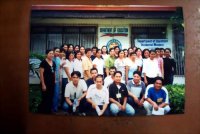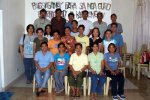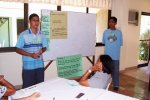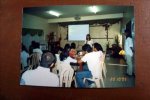

Início
Publicado em 6 de janeiro de 2006
Traduções disponíveis em:
Activities and discussions on the Charter
por Aleli BAWAGAN
Temas largos ligados:
Indigenous peoples .
Educação .
Human Rights .
Teachers .
1.Introduction
In 2004, OTRADEV produced the video “Iraya Mangyan: Tugon sa Hamon ng Panahon”, a video-documentation about the life of the Iraya Mangyans of Mindoro and how they are able to exercise their human responsibilities, towards their fellow Mangyans, other lowlanders and with the environment. Copies of the video were distributed to schools in selected towns of Oriental Mindoro where Iraya Mangyans reside, specifically in Calapan, Baco, San Teodoro, and Puerto Galera. Together with the video was a teachers’ guide for the discussion arising from the video presentation.
However, given the variation in the understanding of high school teachers on the concept of human responsibility, there is a need to provide guidance to the educator. There is also a need to provide the teachers with assistance on facilitation methodology, to maximize the learning process for the students. Hence, it was still deemed necessary to hold a seminar-workshop among the teachers in both Oriental and Occidental Mindoro to have a deeper discussion on the situation of the Iraya Mangyans, how the video can be fully incorporated into their curriculum and how human responsibility can be practiced too by the teachers, students and other people in the community. Aside from the teachers, OTRADEV also decided to hold a discussion on the Charter of Human Responsibilities among its members and other advocates in Metro Manila to further enhance their understanding of the charter and the principles attached to it. The selected advocates in Metro Manila can be harnessed to further disseminate the concept of human responsibility and ventilate the issues faced by the Iraya. This will hopefully generate additional interest and support to their plight.
2. Activities
Preparatory Phase. The training team for OTRADEV was organized to prepare for the program activities. The team coordinated with the officials of the Department of Educaiton in both Oriental and Occidental Mindoro to arrange for the training schedules, participants, venue and other logistical concerns. The training module, materials, resource persons, invitations were also finalized after a series of meetings. It was decided to hold the trainings in October where both the members of the training team and the participants both have relatively free time.
Seminar-Workshops. The training in Calapan, Oriental Mindoro was held October 15 – 16, while the training in Mamburao, Occidental Mindoro was conducted October 22 – 23, 2005. Twenty participants attended in Calapan, and twenty-eight in Mamburao. The flow of the trainings was as follows:
i. Welcome Remarks by Department of Education official
ii. Introduction of Participants and Checking of Expectations
iii. Introduction of the Training Team
iv. Discussion of the background of the seminar/workshop
v. Background on OTRADEV Foundation
vi. Workshop I: How the Iraya Mangyan Situation is Discussed in Class
vii. Sharing of Workshop Results
viii. Video Showing: Iraya Mangyan: Tugon sa Hamon ng Panahon
ix. Discussion on the Iraya Mangyan Situation
x. Workshop 2: How the Video can be Integrated in their Lessons
xi. Discussion on the Charter of Human Responsibility
xii. Critiquing and Presentation of Workshop Results/ Demo
xiii. Over-all Synthesis
xiv. Evaluation
xv. Closing Remarks
Some highlights of the training discussions and workshop:
![]() On how the topic of Iraya Mangyans is being discussed in class: The teachers mentioned that they have very little opportunities in class to talk about the culture and lifeways of the Iraya Mangyans. There are discussions when the class topic relates to the indigenous peoples of the Philippines or topics related to Philippine culture and the environment. However, the teachers are not able to deepen the discussions because they hardly have any materials to guide their discussions. Moreover, they mentioned that there is still some discrimination even among the school children with regards their Mangyan classamates. There are also a lot of misconceptions about the Irayas, e.g. they do not have any ambitions in life; they are lazy; illiterate; do not associate well with the lowlanders.
On how the topic of Iraya Mangyans is being discussed in class: The teachers mentioned that they have very little opportunities in class to talk about the culture and lifeways of the Iraya Mangyans. There are discussions when the class topic relates to the indigenous peoples of the Philippines or topics related to Philippine culture and the environment. However, the teachers are not able to deepen the discussions because they hardly have any materials to guide their discussions. Moreover, they mentioned that there is still some discrimination even among the school children with regards their Mangyan classamates. There are also a lot of misconceptions about the Irayas, e.g. they do not have any ambitions in life; they are lazy; illiterate; do not associate well with the lowlanders.
![]() The video was very effective in terms of raising the awareness of the teachers regarding how the Mangyans live their lives in the uplands, their beliefs and practices regarding child-rearing and taking care of the environment, conflicts with the lowlanders and their continuing struggles regarding land rights, their own ambitions for their children. The feedback of the teachers after the video were on the following points: rights as indigenous peoples; they are a loving, industrious, diligent people; they have grievances against the government and are seeking justice; they are asserting their rights to ancestral domain; learned about their culture, like the customary laws; and they have ambitions to be educated as well.
The video was very effective in terms of raising the awareness of the teachers regarding how the Mangyans live their lives in the uplands, their beliefs and practices regarding child-rearing and taking care of the environment, conflicts with the lowlanders and their continuing struggles regarding land rights, their own ambitions for their children. The feedback of the teachers after the video were on the following points: rights as indigenous peoples; they are a loving, industrious, diligent people; they have grievances against the government and are seeking justice; they are asserting their rights to ancestral domain; learned about their culture, like the customary laws; and they have ambitions to be educated as well.
![]() Based on the video, the teachers recommended that a more appropriate curriculum be developed and implemented with the Iraya Mangyan children, in order to discuss better their own culture, beliefs, practices. They also recommended that more teachers be assigned to Mangyan communities, specially those located in the uplands.
Based on the video, the teachers recommended that a more appropriate curriculum be developed and implemented with the Iraya Mangyan children, in order to discuss better their own culture, beliefs, practices. They also recommended that more teachers be assigned to Mangyan communities, specially those located in the uplands.
![]() On the discussion of the charter of human responsibility and how the principles can be lived out by the teachers and other members of the school community, the teachers cited the following: principle of non-discrimination and respect for diversity of cultures and beliefs can still be enhanced even among the teachers themselves and more so among the non-Mangyan students; it is important for the teachers and students to respect the dignity and rights of others; respect for the environment; need for critical thinking in assessing the benefits and impact of government laws, policies and programs, specially if these affect the life of the Iraya Mangyans; gender-equality.
On the discussion of the charter of human responsibility and how the principles can be lived out by the teachers and other members of the school community, the teachers cited the following: principle of non-discrimination and respect for diversity of cultures and beliefs can still be enhanced even among the teachers themselves and more so among the non-Mangyan students; it is important for the teachers and students to respect the dignity and rights of others; respect for the environment; need for critical thinking in assessing the benefits and impact of government laws, policies and programs, specially if these affect the life of the Iraya Mangyans; gender-equality.
![]() On how the video can be integrated in their classes: The teachers demonstrated how the video can be integrated in the following classes – English, Filipino, Math, Social Studies and History. During the presentations, the teachers realized that there are various methods and topics where the video can be used as a teaching material and how it can enhance the discussions about the Mangyans in the province.
On how the video can be integrated in their classes: The teachers demonstrated how the video can be integrated in the following classes – English, Filipino, Math, Social Studies and History. During the presentations, the teachers realized that there are various methods and topics where the video can be used as a teaching material and how it can enhance the discussions about the Mangyans in the province.
![]() The teachers recommended that more discussions about the Iraya Mangyans be held since they realized that they themselves lack the necessary knowledge on how to handle their Mangyan students more effectively. Aside from this, they articulated the need to have a more appropriate curriculum and pedagogy for the Iraya Mangyans.
The teachers recommended that more discussions about the Iraya Mangyans be held since they realized that they themselves lack the necessary knowledge on how to handle their Mangyan students more effectively. Aside from this, they articulated the need to have a more appropriate curriculum and pedagogy for the Iraya Mangyans.
Evaluation. The evaluation was done after the two – day workshop. The teachers were very happy with the workshop and hoped that there will be more workshops about the Iraya Mangyans to make them more effective teachers to the indigenous peoples. Revisions in the curriculum and more appropriate teaching materials were also recommended.
3. Discussion of the Charter of Human Responsibilities with Advocates of Mangyan Rights and Welfare
Two discussions on the Charter among advocates were held. The first was on September 3, 2005 and second with a bigger group on December 3, 2005. The first discussion was attended by nine social development workers. (See documentation titled Reflections on the Charter of Human Responsibilities by OTRADEV). The second discussion was attended by two Iraya Mangyans, 7 fisherfolk leaders from Laguna Lake, 14 some representatives from NGOs, NGO networks, academe, and 25 OTRADEV members and guests. The video on the Iraya Mangyans was also presented, after which the discussion on the charter and its principles followed. Copies of the video and primer were also shared with those who attended the discussion. They mentioned that they will hold further discussions among their own NGOs regarding the charter.
4. Training Team
The overall training coordinator was Aleli B. Bawagan. The team for each training was composed of:
Oriental Mindoro training: Ruben Martinez, Marilou Cerilla, Corazon Gratuito, Fleur de Lys Castelo-Cupino, Orlando Maliwanag;
Occidental Mindoro training: Marilou Cerilla, Merlyn Martinez, Corazon Gratuito, Tess Tejada, Maville Dizon and Orlando Maliwanag.
5. Recommendation
OTRADEV is seriously considering the development of culturally – sensitive curriculum and teaching materials for the formal education sector in both Mindoro provinces. Financial support will be sought towards this endeavour.





